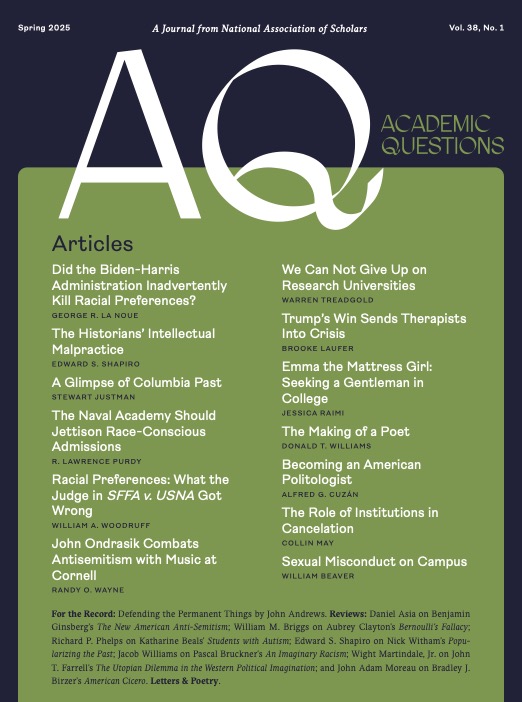The New American Anti-Semitism: The Left, the Right, and the Jews, Benjamin Ginsberg, Independent Institute, pp. 231, $27.00 hardcover.
Benjamin Ginsberg’s The New American Anti-Semitism comes at a time when antisemitism, in speech and deed, has exploded across America. It ramped up dramatically the day after October 7, 2023, when Hamas attacked Israel, killing 1,200 Israelis, including foreign workers, and kidnapping over 250 hostages. Protests immediately started on college campuses and in cities throughout the world, but to the surprise of many, the protests were in solidarity with Hamas, the perpetrators of the crime and a terrorist group boasting the goal of killing all Jews.
The child of Holocaust survivors, Ginsberg is a renowned political scientist and researcher, now at the Independent Institute, who, in his twenty-odd books and other writings, has forged a reputation for diligent research and scrupulous nonpartisanship, sometimes on hotly contested topics. It is fitting, therefore, that he would turn his attention to the problem of antisemitism, the “oldest hatred” that only a decade ago could be fairly said to have been vanquished from American public life but that has now taken center stage in America’s culture wars. Ginsberg thinks that America has been good to the Jews, and the Jews good for it, but he fears that the freedom and prosperity enjoyed during what some have called the “Golden Age” of American Jewry may be fast receding.
According to Ginsberg, this is primarily because the Left has been ascendant in some of America’s most powerful institutions, bringing with it significant anti-Israel and antisemitic sentiment. Like most totalizing theories which see Jewish group identity as an obstacle to a universal vision, Marxism has long been hostile toward the Jews. But at least since Israel’s victory in the 1967 Six Day War, the Left has seen the Jewish state as the primary global symbol of Western imperialism and colonial domination. For the Left, Israel is a Western beachhead amidst a sea of formerly colonized states and a Palestinian population that is easily portrayed as the most prominent of all victimized Third World peoples.
While the Left insists that its anti-Zionism (opposition to a Jewish national homeland) is not antisemitism (hatred of the Jews), Ginsberg says that can only be established by answering three critical questions: “First, does the putatively anti-Zionist group or individual make use of well-established anti-Semitic imagery and tropes or comments on Jews specifically when censuring Israel?”; “Is the evidence proffered of no malice toward Jews proportionate to vehemence toward Israel?”; “What evidence do anti-Zionists offer to deny being antisemites?”
Ginsberg answers these questions and persuasively argues that anti-Zionists deny Israel’s legitimacy using standards not imposed on other nations. For example, the founding of Israel is said by anti-Zionists to have been nothing more than a twentieth century land grab. But even if that were true, Ginsburg points out, it would not be atypical. At some point, almost every nation had to declare sovereignty over geographic space claimed by others. And Jews in British mandate Palestine, it can be credibly argued, bought most of the land Israel now claims at market prices from owners, many of whom were Arabs.
More importantly, Ginsberg points out that Israel is the only nation in the Middle East whose creation was sanctioned by the United Nations, giving it more than a patina of international legitimacy. This is not true of neighboring states such as Lebanon and Syria, which were made independent in the twentieth century merely by writ of their former colonial rulers (Britain, France, and the Ottoman empire) and mostly without international agreement.
Given that Israel’s creation was the product of a war begun after the Jews accepted a UN partition plan rejected by the Arabs, Ginsberg—perhaps wistfully—concludes, “The main difference between the Israelis and other contemporary landowners is that Israel … tried to accommodate its Arab enemies.” (11)
For all of these reasons—and with consideration for the centrality of Israel in Jewish belief and experience—Ginsberg concludes that anti-Zionism today is a thinly veiled disguise for antisemitism.
This makes sense when one considers that left-wing anti-Zionism and anti-Semitism have evolved from a common foundation in the identity hierarchy propounded in radical progressive thought. For the “woke,” the success of Zionism and the general affluence of diaspora Jews originate in the same place: the privilege of sitting atop an oppressive racial pyramid as white inheritors of European civilization. “Since Jews are wealthy whites, and the Jews of Israel, their critics say, mistreat people of color,” Ginsberg writes, “Anti-Zionism and antisemitism arise naturally from intersectional thinking.” (4) So, while radical Blacks, LGBTQ+, feminists, Marxists, anarchists, and anti-capitalists have their differences, they all find common ground in their resentment of Israel and Jews. Ginsberg sees all of this acted out in our universities and spreading to other parts of society.
None of this comes as a surprise to those familiar with recent literature on the topic, though Ginsberg’s use of historical and scholarly sources makes the argument more poignant than that found in other treatments. The same could be said for Ginsberg’s lengthy and complex discussion of Jewish identity—the insistence of even assimilated American Jews on Jewish “otherness”—and the role it likely plays in rendering Jews an easy mark for extremists on both sides of the political divide. His discussion of antisemitism in America—sometimes exaggerated, sometimes underestimated—should be read widely.
But the most important and newsworthy aspect of the book is Ginsberg’s take on what American Jews should do about rising antisemitism. In brief, while Jews have long been tied politically to the Democratic party, Ginsberg believes they should look for new allies on the Right, since their old allies on the Left have largely abandoned them.
Before Franklin Delano Roosevelt’s New Deal, Jews mostly supported Republicans, as Democrats derived support from Christian Fundamentalists and populists, two movements that historically contained a fair bit of antisemitism. But Jews had long had an attachment to the political Left, with leftist parties in Enlightenment-era Europe promising social emancipation and equal citizenship and rightists defending the rigid social structure of the past. And while FDR was no friend of the Jews (he stubbornly refused to admit large numbers of Jews fleeing Nazism) he gained Jewish loyalty for the Dems by providing relief for workers, employing prominent Jews in his administration, and commanding the successful fight against Hitler.
Throughout the postwar expansion of government, Jews came to play a significant role in Democratic politics, and as educated professionals their interests aligned with the expansion of the federal government and other public and private bureaucracies. Large numbers of Jews were brought into the Kennedy and Johnson administrations, and an increasing number of Jewish Democrats were elected to office. Jews, says Ginsberg, stay allied with the Democrats because “liberal democracy has protected them from their enemies and serves as the source of their power and place in American society.” (145)
Jews have been loath to give up this status and power, even as the Democrats have moved away from equal opportunity and “ironclad” support of Israel. For American Jews, Ginsberg writes, “Democratic Party membership is almost a religious affiliation—and Jews are notoriously averse to conversion.”
But the time has come for Jews to convert … politically. Ginsberg insists that old loyalties must be left behind to fit this change in circumstances: “the antisemitism of the left is a much greater threat to American Jews today” than anything being promulgated on the Right. (152) While Jews have lived and been accepted among the elite, that strata of society is moving away from its past alliance with Jews and Israel.
At the same time, a large number of Republican-voting non-Jews—including Christian Evangelicals—have become supportive of Jews and Israel. Many religious Christians believe that God designated the Holy Land for the Jewish people, thus their support for the Jewish state. While Ginsberg discusses the often misunderstood concept of “premillennial dispensationalism”—the impetus for much Christian support of Israel—it is sufficient to note only that American forms of Christianity have evolved in a way that tends to see Jews playing an important and mostly honorable role in human history. So while secular and liberal Jewish denominations have found it discomforting, Ginsberg believes there is no reason why Jews shouldn’t welcome this vigorous support.
Ginsberg acknowledges that Jews find this advice hard to accept but insists that they shift their thinking according to the new reality. While antisemitism has also surged on the margins of the Right, the current threat of antisemitism is greater on the Left, through the “lodestone of intersectionality.” It is impossible, Ginsberg argues, for even the most partisan Jewish Democrats not to notice that the voices of those who have protested on behalf of Hamas in the current war, and who have raised the false cry of Israeli “genocide,” have come from the Left, including from within the Democratic party.
Not only has the Biden/Harris administration contributed vocally to the notion that Israel’s response to the Hamas attacks has been “disproportionate,” but ten of the eleven U.S. Senators who signed a 2024 bill questioning Israel’s human rights record during its defensive war against Hamas were Democrats.
It isn’t clear whether American Jews will take Ginsberg’s advice. Data from the 2024 presidential election indicates a modest swing to Republican Donald Trump in heavily Jewish areas, but nothing approaching the 50 percent mark some Republicans were hoping for. Given that Jews are confronting a period of undeniable hostility here and around the world, it is reasonable to ask if there is no price American Jews aren’t willing to pay for their loyalty to the Left.
Daniel Asia is an American composer whose work ranges from solo pieces to large scale multimovement works for orchestra, including six symphonies. From 1988-2024 Asia was Professor of Composition and head of the composition department at the University of Arizona in Tucson; [email protected]. He wrote “Is It Art or Entertainment?,” for our Fall 2024 issue.
Photo by Timo Wagner on Unsplash














